Liz Mitchell had never done any acting before, but when a modelling agency called her to play a part in a car commercial, she took it as a chance to expand her experience of living in Taiwan.
"It's kinda fun," said the 23-year-old English teacher from New Hampshire. "It's a different way to make money rather than teaching English every day. I could substitute and make just as much money probably a little more conveniently."
However, she says her first experience of the advertising industry in Taiwan was indicative of what was to come. "It was really chaotic and they really needed foreigners," she said.
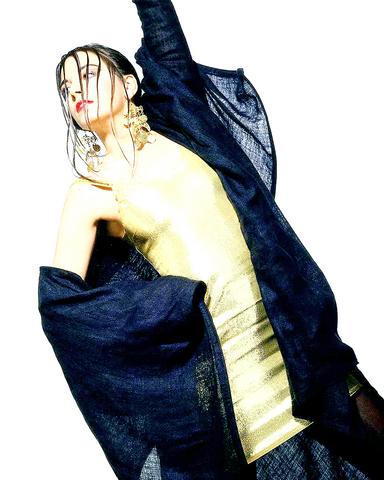
For the next shoot, Mitchell says her agent told her she would be acting in a commercial for Chinese herbal medicine to be shown in China, when it was actually for an enema.
"I didn't find out until I was actually on the set in make-up. If it had been playing in Taiwan I probably wouldn't have done it," she said.
Mitchell is one of many foreigners in Taiwan who have been put off by this unusual line of work because of misunderstandings and what some say is blatant deceit.
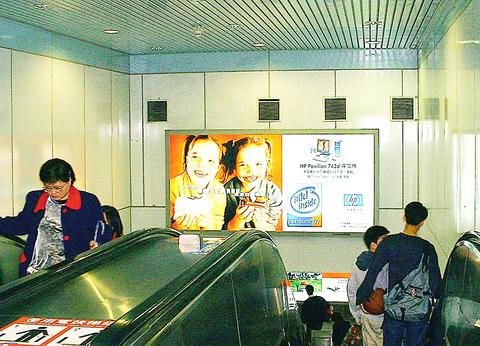
PHOTO: GRAHAM NORRIS
For many foreign models, their experience of the advertising industry in Taiwan starts outside popular pubs and clubs, such as Roxy 99 or Vibe, through an encounter on the street with an agent or, increasingly, through friends.
Gary Tai, an independent model agent, says that the companies he works with frequently try to find models outside Taipei's bars, but that restricts the kind of foreigners they find.
"It's not good because there are a lot of more suitable foreigners in Taiwan and they are not there," Tai said. "I don't go to the bars, I go out during the day [to find foreign models] and I will tell them what I do."
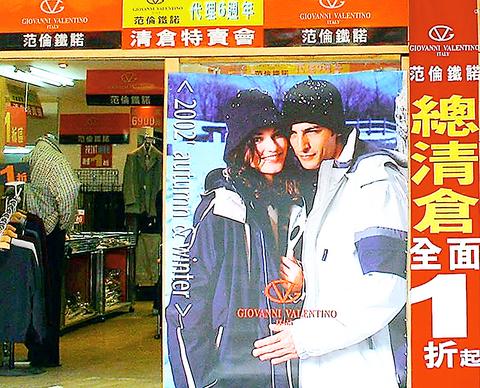
Faith Huang, another independent agent, thinks that growing demand for foreign models for commercials has made some agencies more desperate.
"Basically they take whoever they see," she said, "because there are many different projects with many different requirements."
Huang, who has between 50 and 60 foreign models on her books, said that although foreigners are still rarely the main character in television commercials, many larger, international companies require foreigners for their advertisements.
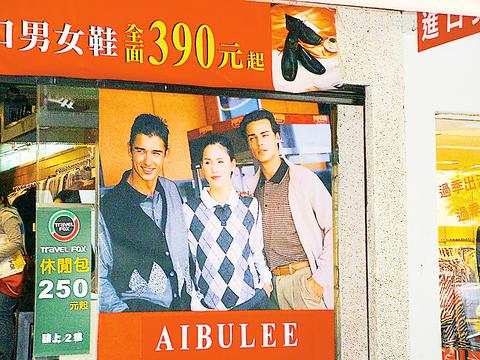
Asked why, Huang said some companies wanted to present a certain image. For a car commercial, for instance, "if you have a Taiwanese person doing that, it doesn't look very good," she said.
Frustrating environment
But for some foreigners, with no acting experience or Chinese skills, their experience of the advertising industry in Taiwan can be frustrating.
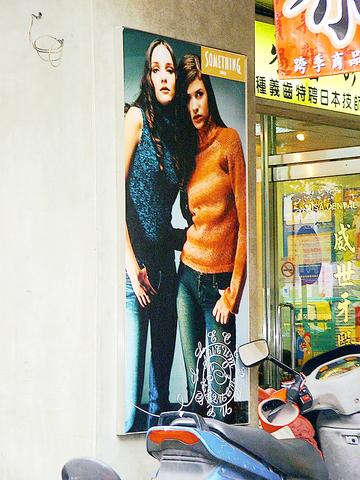
Jay Joubert, a 29-year-old English teacher from Capetown, South Africa, who has acted in several television commercials outside Taiwan, was not impressed by his experience in a commercial for an impotence drug.
"I've done one ad in Taiwan and that's it," he said.
"Never again will I work in this industry in Taiwan. Very dodgy compared to the rest of the world. Very unprofessional."
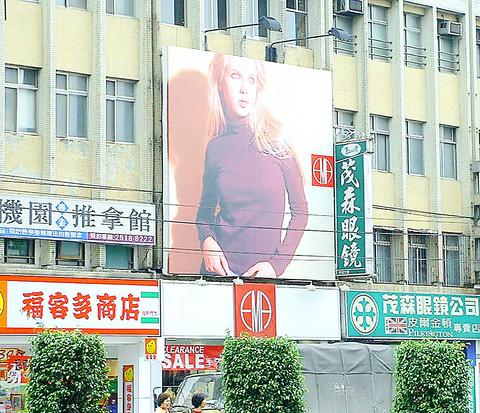
Some of the problems stem from the large number of people involved in making a commercial, with the model at the end of the line trying to understand what is expected of him or her.
The company with a product to sell may have its own marketing department to design commercials, otherwise it will hire an advertising agency. The marketing department or advertising agency will then hire a production company to shoot it. The production company in turn will get models through one or more agencies, who will then contact suitable models for auditions.
The process is based largely on word of mouth, with models having to trust that their agents will not get them involved in anything they don't want to do. There are no contracts and the only thing models sign is a broadcast agreement, allowing the production company to screen whatever material they have of the model.
Huang said it can be difficult working with agencies because of the long chain of command. "Sometimes when I talk to [the agency] and I ask for more money for the models or ask for shorter filming time, the agency cannot decide that. They have to go and ask the production company," she said. "Sometimes the production company cannot decide a lot of things, they have to go back and ask the product company. So it's very complicated."
Some models and agents suspect that the pressure of deadlines causes production companies or agencies to lie, lies that can sometimes be passed on unknowingly.
"I have no problem talking to the model, but I have problems talking with the agency," Huang said. "Because a lot of times the production company lies to the agency, and the agency doesn't know and they tell me.
"Or the production company didn't lie to the agency but the agency lies to me, because they want to get projects done. That's the way most Taiwanese people do business," she said.
Mitchell, who's appeared in commercials for Seven-11 and Nissan in Taiwan as well as the enema commercial, thinks production companies are frequently economical with the truth when it comes to specifying what the commercial will be about and what the models will be required to do.
"I honestly think a lot of the production companies lie to the agents," she said. "I know my agent. I don't think she would intentionally go out of her way and say they just want you to do this but really she knew that they wanted you to do more."
Mitchell has decided, at least temporarily, to stop acting in commercials after shooting one for an impotency drug in which she says she was asked to do a lot more than her agent had told her about. "How much the production company tells the agency I guess varies," she said.
Huang said one source of confusion was the lack of written agreements.
"They just talk on the phone and have oral agreements. They don't have written agreements for any projects. Not even the big ones," she said.
Joubert said the lack of contracts meant the production companies had little incentive to be honest.
"There are no guidelines, there's no agreement and even if there are agreements it's verbal rather than written," he said. "Nothing signed beforehand. Basically, it leaves the production company in the position to do whatever it wants to."
Communication problems
Nevertheless, an agent at one of Taiwan's larger agencies said that misunderstandings could be kept to a minimum.
"We don't have this kind of problem," said Renee Liu, an agent at V&L, which has more than 300 foreign models on their books. "I will tell the model what kind of role they will be playing."
Money can be a major sticking point in negotiations between the model and agent, and agent and production company.
Models can make from NT$600 an hour to play an extra in a television commercial, up to tens of thousands for longer shoots where they might be required to do more.
What the model gets frequently depends on the agent, who will be paid a lump sum from the production company.
Most agents were unwilling to reveal what percentage of the money they received from the production company went to the model, although Huang said typically agents would keep 30 percent to 50 percent. She said she got only 10 percent.
However, getting paid on time can be a problem. Even though Tai, who takes care of 15 models, says he trusts the production company he works with -- he has been with them four years -- getting money out of them can be tricky.
"The production company will always pay late," he said. "They will say, `I will pay you next week.' So I tell the model, `I will pay you next week.' Then they [the production company] say `I can't pay you. Is that OK, that I pay you later?'"
He says this kind of delay can destroy trust between the model and the agent. "The foreigner will always think that the Chinese will always take advantage of them. They don't trust Taiwanese people," he said.
Steven Yu, who deals with 40 to 50 models for Hwli agency, also said he gets frustrated with foreign models who don't understand what it's like for the agent.
"They only want cash, not a check," Yu said, "and they want it straight away, whereas I have to wait a month."
He also complained that foreign models are unreliable and can become awkward when the shoot runs longer than expected, which frequently happens.
"Chinese models are OK to do overtime," he said. "If a foreign model cares about money too much it becomes a problem. If they have to work overtime for 20 to 30 minutes it's OK for the Chinese models but not for the foreign models.
"The foreign models don't keep their promises very well. If you make an appointment one day then they won't turn up. They are always on vacation," he said.
Huang advises would-be models to ask a lot of questions before agreeing to do anything.
"Only do the commercial that you think will be really safe," she said. "Before you go to the agency you should make it clear what kind of commercial you want to do because once you do it everything is so complicated and it's not very easy to solve if there's a problem."
Despite the pitfalls, many foreigners appreciate the chance to do something they probably couldn't in their home countries.
Even though she doesn't plan to do any more commercials, Mitchell was happy to do something a bit unusual.
"Each set is different, each shoot is different, each commercial is different," Mitchell said. "It's not boring work."

June 23 to June 29 After capturing the walled city of Hsinchu on June 22, 1895, the Japanese hoped to quickly push south and seize control of Taiwan’s entire west coast — but their advance was stalled for more than a month. Not only did local Hakka fighters continue to cause them headaches, resistance forces even attempted to retake the city three times. “We had planned to occupy Anping (Tainan) and Takao (Kaohsiung) as soon as possible, but ever since we took Hsinchu, nearby bandits proclaiming to be ‘righteous people’ (義民) have been destroying train tracks and electrical cables, and gathering in villages

Dr. Y. Tony Yang, Associate Dean of Health Policy and Population Science at George Washington University, argued last week in a piece for the Taipei Times about former president Ma Ying-jeou (馬英九) leading a student delegation to the People’s Republic of China (PRC) that, “The real question is not whether Ma’s visit helps or hurts Taiwan — it is why Taiwan lacks a sophisticated, multi-track approach to one of the most complex geopolitical relationships in the world” (“Ma’s Visit, DPP’s Blind Spot,” June 18, page 8). Yang contends that the Democratic Progressive Party (DPP) has a blind spot: “By treating any

This year will go down in the history books. Taiwan faces enormous turmoil and uncertainty in the coming months. Which political parties are in a good position to handle big changes? All of the main parties are beset with challenges. Taking stock, this column examined the Taiwan People’s Party (TPP) (“Huang Kuo-chang’s choking the life out of the TPP,” May 28, page 12), the Democratic Progressive Party (DPP) (“Challenges amid choppy waters for the DPP,” June 14, page 12) and the Chinese Nationalist Party (KMT) (“KMT struggles to seize opportunities as ‘interesting times’ loom,” June 20, page 11). Times like these can

Swooping low over the banks of a Nile River tributary, an aid flight run by retired American military officers released a stream of food-stuffed sacks over a town emptied by fighting in South Sudan, a country wracked by conflict. Last week’s air drop was the latest in a controversial development — private contracting firms led by former US intelligence officers and military veterans delivering aid to some of the world’s deadliest conflict zones, in operations organized with governments that are combatants in the conflicts. The moves are roiling the global aid community, which warns of a more militarized, politicized and profit-seeking trend